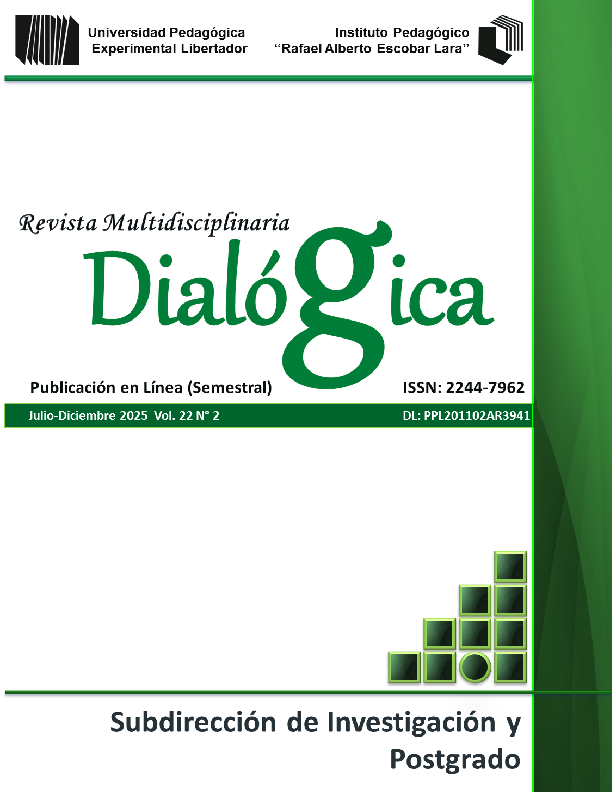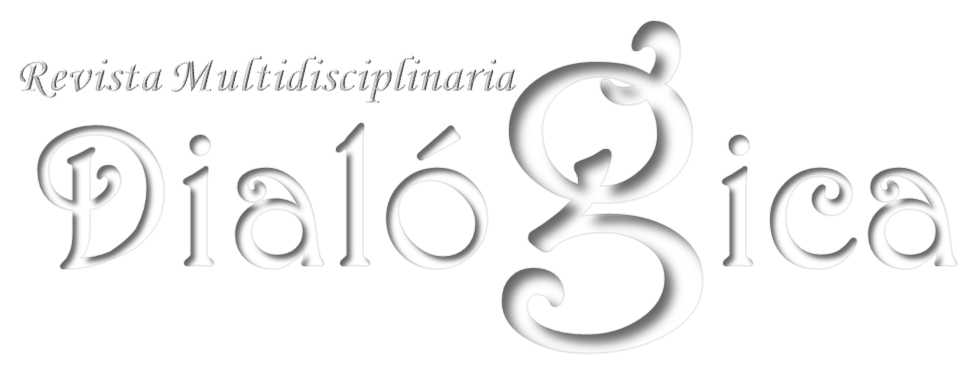Social representations of managerial communication from the perspective of directors and teachers
DOI:
https://doi.org/10.56219/dialgica.v22i2.3790Keywords:
Social representations, communication, educational management, teachersAbstract
Managerial communication is key in the coordination and productivity of educational institutions, facilitating the exchange and analysis of information between areas and levels. This research seeks to construct a theoretical framework on the social representations of managerial communication from the perspective of directors and teachers in schools in the La Ureña sector, Dominican Republic. A qualitative and interpretative approach will be adopted, using a phenomenological method with techniques such as participant observation and semi-structured interviews. The study will include the collection of information, thematic analysis and formulation of conclusions. The informants will be managers and teachers, and scientific rigor criteria will be applied to ensure the validity of the study. The results highlight that current communicative practices lack integration, evidencing a need for a more proactive communicative management, which not only focuses on operational results, but also on strengthening interpersonal relationships, in order to improve the satisfaction of all the actors involved.
References
Abric, J. C. (2001). Le noyau central des représentations sociales [The central core of social representations]. In J.-C. Abric (Ed.), Pratiques sociales et représentations, 81–96. Presses Universitaires de France.
Álvarez, C. y Lesta, L. (2011). Medición de los aportes de la gestión estratégica de comunicación interna a los objetivos de la organización. Palabra Clave, 14(1), 11-30. https://www.redalyc.org/pdf/649/64920732002.pdf DOI: https://doi.org/10.5294/pacla.2011.14.1.1
Banchs, M. A. (1984). Representaciones sociales y cultura. Editorial Venezolana.
Barnard, C. I. (1959). The functions of the executive. Harvard University Press.
Barrios, J. M. (2013). La innovación educativa pendiente: Formar personas. Erasmus Ediciones.
Berger, P., y Luckmann, T. (1986). La construcción social de la realidad. Amorrortu Editores.
Borjas, G. J. (2011). Labor economics (5th ed.). McGraw-Hill Education.
Castells, M. (2006). La era de la información: Economía, sociedad y cultura (Vol. 1). Alianza Editorial.
Doise, W. (1985). Les représentations sociales: Définitions, structures et fonctions. PUF.
Doise, W. (1999). Human rights studied as social representations. Social Science Information, 30(1), 111–126. DOI: https://doi.org/10.1002/(SICI)1099-0992(199902)29:1<1::AID-EJSP909>3.0.CO;2-#
Doise, W. (1993). L’ancrage dans les études sur les représentations sociales. Bulletin de Psychologie, 46(405), 189–195. DOI: https://doi.org/10.3406/bupsy.1992.14126
Farr, R., y Moscovici, S. (1984). The concept of social representation. In R. Farr y S. Moscovici (Eds.), Social representations, 496–510. Cambridge University Press.
Fernández, E. (2015). Comunicación organizacional: Teoría, práctica y perspectivas. Editorial Universitaria. DOI: https://doi.org/10.15658/CESMAG15.05060105
Fullan, M. (2007). The new meaning of educational change (4th ed.). Teachers College Press.
Fundación para la Educación y el Desarrollo. (2023). Informe sobre la capacitación en comunicación organizacional de directivos escolares.
Ibáñez, T. (1988). La construcción de la realidad social. Siglo XXI Editores.
Jodelet, D. (1984). Les représentations sociales: Un domaine en expansion. In Moscovici, S. (Ed.), Psychologie sociale. Presses Universitaires de France.
Jodelet, D. (1986). La representación social: Entre modernidad y tradición. Revue Française de Sociologie, 27(1), 43-65.
López, R. (2006). Comunicación organizacional: Estrategias y prácticas. McGraw-Hill.
Marina, J. A. (2010). La educación del talento: La teoría de las inteligencias múltiples y su aplicación educativa. Editorial Ariel.
Martín-Barbero, J. (1987). De los medios a las mediaciones: Comunicación, cultura y hegemonía. Ediciones Gustavo Gili.
Maslow, A. H. (1982). Motivation and Personality. Harper & Row.
Mayo, E. (1972). The Human Problems of an Industrial Civilization. Routledge.
Méndez, L. (2018). La educación inclusiva en América Latina: Retos y perspectivas. Editorial Educa.
Moscovici, S. (1985). La psico-socialización: La construcción social de las representaciones. Ediciones Akal.
Moscovici, S. (1985). The Phenomenon of Social Representations. In R. Farr & S. Moscovici (Eds.), Social Representations. Cambridge University Press.
Northouse, P. G. (2016). Leadership: Theory and practice (7th ed.). SAGE Publications.
Pérez, R. (2019). Innovación educativa en el siglo XXI: Estrategias y enfoques para el aula. Editorial Aula Magna.
Requeijo, J. (2008). La psicología educativa: Enfoques y prácticas en el aula. Editorial Narcea.
Rubira, R. y Puebla, B. (2018). Representaciones sociales y comunicación: apuntes teóricos para un diálogo interdisciplinar inconcluso. Convergencia. Revista de Ciencias Sociales, 25(76), 147-167, https://doi.org/10.29101/crcs.v25i76.4590 DOI: https://doi.org/10.29101/crcs.v25i76.4590
Sampedro, M., y Resina, J. (2010). La pedagogía en el siglo XXI: Nuevas teorías y prácticas. Editorial Pearson.
Serrano, M. (1981). Teoría de la comunicación: Un enfoque estratégico para la investigación. Editorial Alianza.
Tschannen, M. (2009). Trust matters: Leadership for successful schools. Jossey-Bass.
Wagner, W., Duveen, G., Farr, R., Jovchelovitch, S., Lorenzi-Cioldi, F., Marková, I., & Rose, D. (1999). Theory and method of social representations. Asian Journal of Social Psychology, 2(1), 95-125. DOI: https://doi.org/10.1111/1467-839X.00028
Published
How to Cite
Issue
Section
License
Copyright (c) 2025 Luis Manuel Hernández

This work is licensed under a Creative Commons Attribution-NonCommercial-ShareAlike 4.0 International License.


 @revistadialogica
@revistadialogica DialogicaUPEL
DialogicaUPEL RevistaDialogicaUPELMaracay
RevistaDialogicaUPELMaracay dialógicaupel@gmail.com
dialógicaupel@gmail.com dialogicaupel.blogspot.com
dialogicaupel.blogspot.com https://issuu.com/dialogicaupel
https://issuu.com/dialogicaupel https://revistas.upel.edu.ve/index.php/dialogica/
https://revistas.upel.edu.ve/index.php/dialogica/









